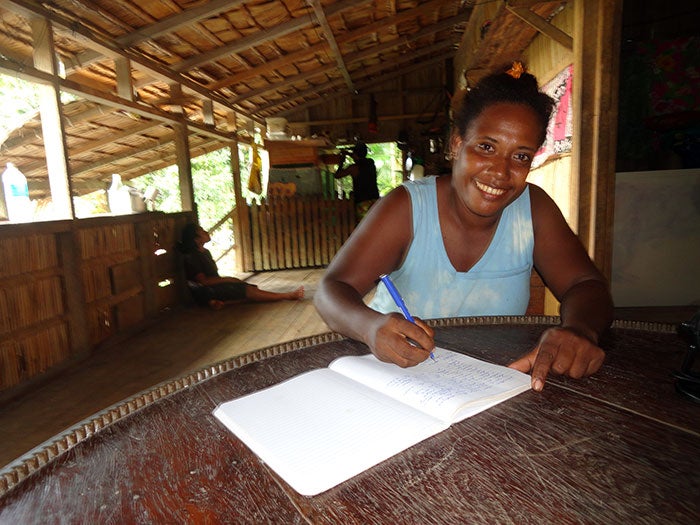
In a hot and crowded school classroom in December 2015 I sat excitedly watching Margaret Wete accept her role as Village Peace Warden for Waimasi and neighbouring villages in Makira/Ulawa Province, Solomon Islands. She was the first woman to be elected into this role by her community and I took it as a positive sign that the majority of those present for the vote were young women and men, making an important decision for the community’s future and putting their faith in a fellow young person.
At the end of “the tensions”, a civil war in Solomon Islands which lasted from 1998 to 2003, peace was something not many people could picture. The government requested, and received, support from the region and 14 years of RAMSI – the Regional Assistance Mission to Solomon Islands – ensued.
I moved to Solomon Islands in 2010 and was privileged to see many of the peacebuilding activities roll out and support communities to take the lead in creating a more harmonious society. The use of Village Peace Wardens was one of these, coming under the Community Governance and Grievance Management Project. Through the project, Village Peace Wardens – as they are called in Makira – are elected by communities to help chiefs, church and other leaders and community members resolve low-level local conflicts peacefully, with assistance from government when needed.
There are currently 29 Village Peace Wardens in Makira/Ulawa Province, but only two of them are women. Sometimes it can be because the women themselves don’t have the confidence to take on the role.
Margaret herself was reluctant at first, saying, “When the time comes for public speaking, I was not brave to talk and look in the eyes of people, that made me reluctant but after a while I decided to try it. The story going around was that people said I would be easy to approach and come to, they liked to have a man, but some men are hard to approach. People said ‘we want you to accept the position’, women said, ‘we won’t feel frightened to come to you’, so they chose me and I decided to take up the role of Peace Warden.”
But since accepting the position, Margaret’s proven she’s more than capable, from having an active involvement in the drafting of local bylaws, to working closely with chiefs, often going to incidents to get information and make reports. A lot of the issues she deals with involve thefts (including pigs or crops) or people drinking, fighting, or making noise that disturbs the community. She also proactively engages with known “troublemakers” to encourage them into alternative activities.
To be successful, Margaret encourages teamwork, and getting back up from the police and government when needed: “I like my work and can see it is good but I also advise people in the community we must work together, wardens need help from everyone in community, they can’t do it alone. Police also need to come down to support the local peace wardens and make awareness. Sometimes I think if peace wardens talk but police do not show their faces here, people will not worry about it, the province needs to work with the wardens too.”
Margaret has shown herself, and her community, that restoring peace is possible, and today – the International Day of Peace – I congratulate her and the work she’s done and look forward to her continued success.


Join the Conversation